Last month, I participated in my first duel. Armed with my 19th-century-style Italian saber, I attempted to follow the instructions of my teacher, Michael Knazko.
Maintain a distance of approximately two feet, right leg bending slightly.
Grip the steel weapon firmly with the right hand.
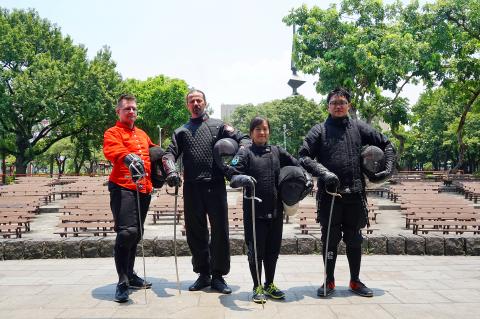
Photo: Dana Ter, Taipei Times
Keep the left hand affixed to my waist.
Use legwork to project my body weight to the tip of the sword.
Most important: do not execute cuts to my opponent’s legs. He will swoop in and slice my face.
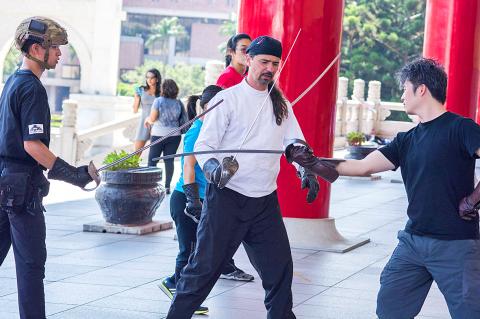
Photo courtesy of Jonathan Burke
Execute circular cuts instead. Strike at the torso.
I repeated this in my head as I sweated through my protective gear. Padded jackets made with heavy cotton might have been built to withstand at least 350 Newtons of force — and harsh European winters — but they are unforgiving when worn in the sweltering Taipei summer.
The duel was about as real as 19th-century Italian duels in Taiwan come, except the conclusion was less dramatic: My opponent and I shake hands and both of us walk away unscathed.
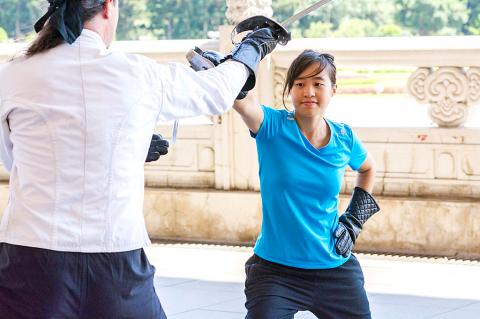
SEEKING AUTHENTICITY
The Lionheart Historical European Swordsmanship club (獅心歷史歐洲劍術) was holding a public training session at the 228 Peace Memorial Park that day. Members meet two to three times a month, usually on Saturdays, at parks and public venues around Taipei, to practice Historical European Martial Arts (HEMA).
Last month, the club invited Knazko, an instructor from the Ars Dimicatoria (Latin for “Art of Fencing”), a HEMA school in Prague, to train them. Knazko, whose long hair is held back in a ponytail, likes to describe dueling as “playing a game of 3D chess” — you’re reacting to your opponent’s moves using a combination of instinct and technique.
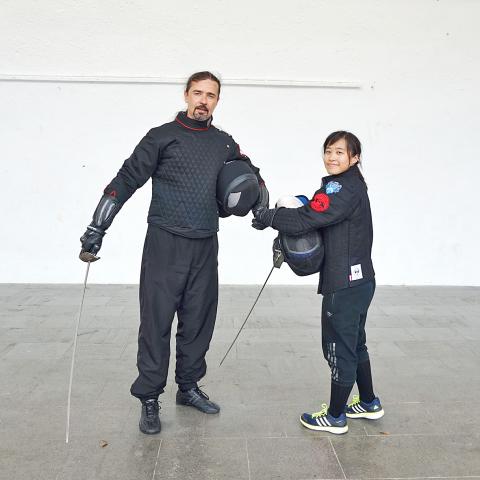
Photo: Dana Ter, Taipei Times
HEMA is big in Europe. Florentia, the HEMA conference held in Florence, Italy every May, brings together HEMA instructors, students and enthusiasts from all over Europe for three days of tournaments, lectures and workshops. Knazko has been attending the conference for years and he tells me that while they recreate duels, it’s really about “enjoyment and friendship.”
Competition and spectatorship are de-emphasized in HEMA, distinguishing it from Olympic-style sports fencing. Also unlike live action role-playing or cosplay, where the participant assumes the role of a fictional character, HEMA seeks authenticity in the form of recreating various styles of European sword fighting over the last few centuries — from Medieval times to the Renaissance — using real steel weapons modeled closely after historical weapons (the Lionheart club imports most of their weapons from Knazko’s school in Prague, while their protective gear is ordered online and shipped to Taiwan).
Beyond being a hobby, HEMA’s purpose, according to its practitioners, is keeping history and tradition alive — all the while ensuring safety through several layers of protective clothing, a deliberate restraint of force and rules against striking people at vulnerable places such as the back of the head.
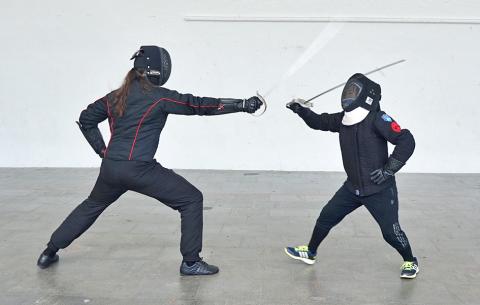
Photo: Dana Ter, Taipei Times
EN GARDE
Of course, there’s also the thrill of handling a real weapon.
“I believe anyone would be lying if they said they didn’t partly start doing HEMA to have fun with steel swords,” says club member Kevin Yang (楊凱文).
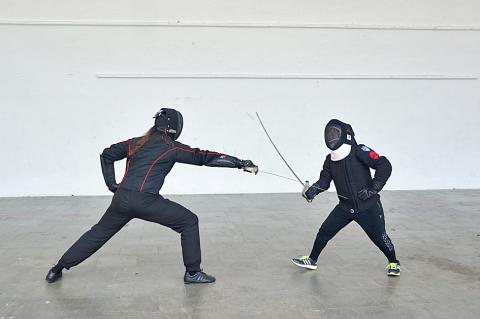
Photo: Dana Ter, Taipei Times
Yang’s interest in swords started with Dungeons and Dragons, the role-playing board game: “I was wondering what the difference is between a long sword, a bastard sword and a short sword,” he says.
This led him to watch YouTube videos of “burly men chopping up objects with huge swords,” which led him to a HEMA Kickstarter project.
The club’s founder, Huang Chun-yi (黃郡儀), was drawn to HEMA the way most practitioners are: consuming popular culture. In particular, watching sword fighting movies and reading Alexandre Dumas’ The Three Musketeers. Huang did some online research on sword fighting where she found a trove of historical fencing manuals.
“I started my practice with a stick,” says the pint-sized 25-year-old.
Huang joined her university’s fencing club to learn more about distance and technique, but after a while, grew disillusioned with the artificiality of the sport, feeling that the point-scoring system was designed for sheer spectator amusement.
In 2014, she founded the Lionheart club, where the focus, like any other HEMA club, is on recreating duels and battlefield moves. The idea, Huang says, is that “you should hit others without being hit.”
HISTORY BUFFS
Most of the club’s members are history buffs and have experience in either sports fencing or Chinese martial arts. In HEMA, like in Chinese martial arts, it’s about channeling the right mindset. To fight like a Medieval or Renaissance sword master, you need to think like one — hence why HEMA practitioners devote much of their time to studying historical manuals written by sword masters.
Yang has a pdf file of the 14th-century Italian knight and fencing master Fiore dei Liberi’s fencing manual, Fior di Battaglia (or “The Flower of Battle”) on his smartphone, which he tries to consult regularly.
“I do not spend enough time studying,” Yang reprimands himself.
Jonathan Burke, another member, agrees that it’s about striking a balance between studying and practicing. He prefers reading commentaries which interpret the historical documents, as a lot of the original manuscripts are written in Spanish, French or Italian.
That being said, a big part of HEMA is knowledge application. As Burke puts it: “If you can’t use your weapon properly, then it’s not going to feel exciting at all; it’s just going to feel like a clumsy, awkward mess, and you’ll end up frustrated and disappointed.”
He thinks pop culture has failed them in the sense that sword fighting is nothing as what you see on television.
“All those enthusiastic baseball bat-style swings you see in the movies are pure fantasy,” Burke says.
After studying the texts, Burke concludes that sword fighters in the past could not have used their weapons that way because it would have been a waste of time and energy. Striking a medieval sword, he says, is an action more akin to “throwing a punch.”
Preserving tradition comes at a hefty price. HEMA jackets built to withstand 800 Newtons of force can cost up to 350 Euros (NT$12,500). Next month, the club will receive an order of swords from a swordsmith in Hungary. The six swords and two scabbards come at a whopping total of 1,605 Euros (NT$57,300).
It’s totally worth it for the club’s members, though.
“We study, practice and have fun together,” Yang says.
After my first duel, the verdict is in: wielding more than 1kg of steel is fun.

As I finally slid into the warm embrace of the hot, clifftop pool, it was a serene moment of reflection. The sound of the river reflected off the cave walls, the white of our camping lights reflected off the dark, shimmering surface of the water, and I reflected on how fortunate I was to be here. After all, the beautiful walk through narrow canyons that had brought us here had been inaccessible for five years — and will be again soon. The day had started at the Huisun Forest Area (惠蓀林場), at the end of Nantou County Route 80, north and east

Specialty sandwiches loaded with the contents of an entire charcuterie board, overflowing with sauces, creams and all manner of creative add-ons, is perhaps one of the biggest global food trends of this year. From London to New York, lines form down the block for mortadella, burrata, pistachio and more stuffed between slices of fresh sourdough, rye or focaccia. To try the trend in Taipei, Munchies Mafia is for sure the spot — could this be the best sandwich in town? Carlos from Spain and Sergio from Mexico opened this spot just seven months ago. The two met working in the

Exceptions to the rule are sometimes revealing. For a brief few years, there was an emerging ideological split between the Democratic Progressive Party (DPP) and Chinese Nationalist Party (KMT) that appeared to be pushing the DPP in a direction that would be considered more liberal, and the KMT more conservative. In the previous column, “The KMT-DPP’s bureaucrat-led developmental state” (Dec. 11, page 12), we examined how Taiwan’s democratic system developed, and how both the two main parties largely accepted a similar consensus on how Taiwan should be run domestically and did not split along the left-right lines more familiar in

A six-episode, behind-the-scenes Disney+ docuseries about Taylor Swift’s Eras Tour and Rian Johnson’s third Knives Out movie, Wake Up Dead Man, are some of the new television, films, music and games headed to a device near you. Also among the streaming offerings worth your time this week: Chip and Joanna Gaines take on a big job revamping a small home in the mountains of Colorado, video gamers can skateboard through hell in Sam Eng’s Skate Story and Rob Reiner gets the band back together for Spinal Tap II: The End Continues. MOVIES ■ Rian Johnson’s third Knives Out movie, Wake Up Dead Man